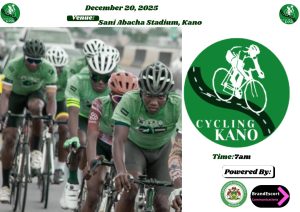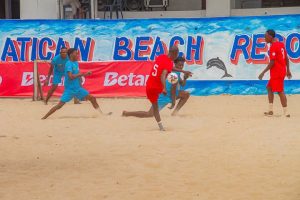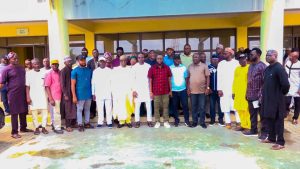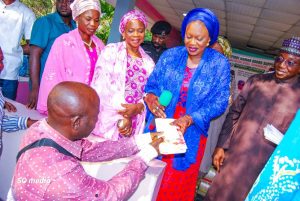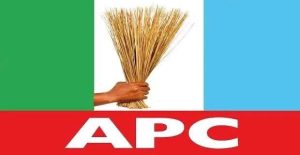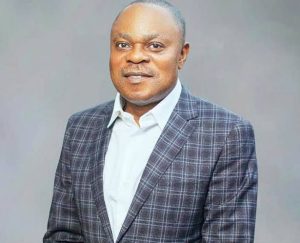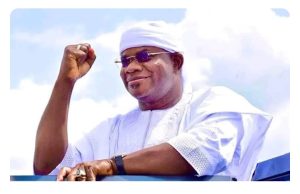Oruma: The travails of an Olympic medalist
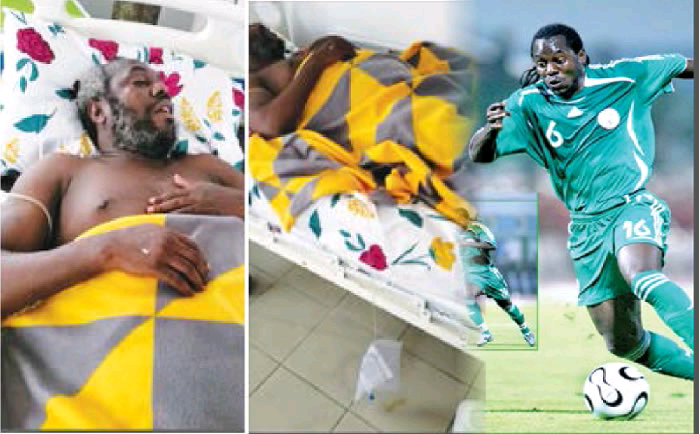
In this report, JOHNNY EDWARD writes on the challenges of Olympic gold medalist Wilson Oruma and other top stars after retiring from football
Many Nigerian fans still remember with glee that July 31, 1996 night, when Nigeria’s U-23 side overcame huge favourites Brazil, who paraded a star-studded side that had Ronaldo de Lima, Rivaldo, Bebeto, Roberto Carlos, Dida amongst others in the semi-finals of that year’s Olympic Games in Atlanta, USA.
In front of 78,587 fans at the Sanford Stadium, Athens, the Nigerians came from 3-1 down to win the tie 4-3 in extra time courtesy of captain Nwankwo Kanu’s Golden Goal.
Many of the fans also remember how Wilson Oruma’s pass from just after the halleway line to Victor Ikpeba erroneously landed on the back of the then Monaco forward’s back, rather than on his path.
Well, no problem. Kanu calmly collected the ball in front of the box, waltzed past his Brazilian marker before firing past Dida, in goal for the South Americans, to fire Nigeria to the final of the Olympics men’s football tournament for the first time ever.
Nigeria went on to beat Argentina 3-2 in the final to claim their first football gold at the global sports showpiece.
Twenty seven years after that triumph, a lot has happened to Oruma, one of the heroes of that historical triumph.
On Friday, a video clip showed the retired midfielder lying helpless on a bed in an unidentified hospital.
In the video, the Olympic gold medalist is on a drip and snoring on his sick bed, while receiving treatment via the urinary catheters.
His ex-teammates also didn’t know Oruma’s ailment or the hospital he is receiving treatment.
“I saw the video as well and I have been trying to find out what really happened to Wilson,” Dosu told Saturday PUNCH.
“Wilson Oruma? Not again,” another of his Atlanta teammate Sunday Oliseh said.
“Its unfortunate. I feel for him and I wish him speedy recovery.”
After a club career in Europe, where he played for the likes of french Ligue 1 sides Lens, Marseille, Sochaux, Guingamp, as well as a stint at Swiss side Servette, winning the UEFA Intertoto Cup, Ligue 1 and French Cup, and earning pay to sustain himself and family after life away from football, Oruma’s calculation didn’t go according to plan after he retired from the game.
In 2016, in his bid to start up a new life after retiring from active football, Oruma was reportedly duped of N2bn by a Lagos while trying to invest in the oil and gas sector.
The retired midfielder, who captained the Golden Eaglets to a second triumph at the U-17 World Cup in Japan in 1993, was allegedly swindled by the pastor, who claimed to be in possession of some oil blocks for sale.
According to reports, Oruma invested his entire fortune into the business plan, before he realised he was defrauded.
Ever since, Oruma has been undergone trying times, and reportedly suffered emotional disorder for about two years.
At some point, reports claimed he was battling with insanity, but help came his way courtesy former President of the Nigerian Football Federation, Amaju Pinnick, who paid his outstanding hospital bills at that time and relocated him to a better equipped one in his bid to rehabilitate the former Nigeria international.
Pinnick also offered him a role in the Flying Eagles in 2017 and was part of the Nigerian delegation to the 2018 U-20 World Cup.
Life on retirement has not been fair to many of the country’s retired footballers, despite amassing wealth during their playing time.
The most recent case is that of former Eagles midfielder Emmanuel Ebiede, who died April 14 in Port Harcourt, the Rivers State capital, after suffering Hepatomegaly (enlargement of the liver).
Before his death, several pictures of the frail-looking and emaciated 47-year-old with a protruding stomach went viral on social media.
Femi Opabunmi. Remember him? He was Nigeria’s youngest ever player at a World Cup and the third
youngest ever after Norman Whiteside and Samuel Eto’o, when he starred for the Eagles in their final group game against England at the 2002 World Cup in Japan and Korea aged 17.
But just four years after he achieved that feat, and having played for Shooting Stars, Grasshoppers Zürich, Hapoel Be’er Sheva and Chamois Niortais in France, his career ended following an eye problem.
“When the eye problem started, I woke up one day and I just saw the cloud, I was not seeing well. Then I went to see a doctor in France, the doctor said it was a case of glaucoma,” Opabunmi said.
“They said my case was complicated, that they didn’t understand everything. We went from one place to another, before I returned to Nigeria and started going from one place to place to see native doctors, anybody.”
He now reportedly resides in his bungalow — the only property he reportedly owns after he sold everything — in Ibadan with his wife and children.
He got a N200,000 lifeline from ace comedian Lawrence Aletile, popularly known as SeyiLaw last Monday.
Also, another Atlanta Olympics football gold medalist Kingsley Obiekwu in 2022 opened up on his financial struggles, which he said compelled him to use his Sienna car for commercial transport in order to sustain himself and his family.
This was after Onyeka Okoh, an Enugu-based journalist, announced via his Facebook page, that he saw Obiekwu in Abakpa motor park, loading buses and driving Sienna to Nsukka, a Local Government Area in Enugu State.
“I hugged and greeted him, then cried… He never made it to the highest level. Where are his teammates? I will tell Kanu Nwankwo about this,” Mr Okoh said via a Facebook post.
“We can help lift him again if he is willing. That environment (motor park) is not for him,” he added.
Hours after Obiekwu’s plight went viral on social media, Super Eagles captain Ahmed Musa supported him with N2m.
There is also the case of former goalkeeper, Peter Fregene,
The 76-year-old Fregene suffered a spinal cord injury in 2001 and was bedridden for 18 years until he received help from billionaire businessman Femi Otedola in July 2019.
Findings by our correspondent showed that there’s no structure in Nigerian football that provides pension and a health insurance for retired national team players, which has seen those unable to properly manage their resources become poverty-stricken, depressed, sick and even resorting to a life of drugs to overcome their pathetic conditions.
Segun Odegbami, a 1980 Africa Cup of Nations winner, said the idea of a welfare scheme to take care of retired footballers had been mooted several times in the past, but nothing was done about it.
“This is a clarion call on the Nigerian Olympians Association, the Professional Footballers Association of Nigeria and other such bodies of athletes to wake up and take responsibility. These are pathetic ones and it is a reminder again of the vulnerability of retired athletes. They must not be abandoned now despite all that was done for him in the past,” Odegbami said.
David Doherty, who contested the presidency of the Nigeria Football Federation at last year’s election, shares Odegbami’s view.
The UK -based football administrator had opened an account for donors to assist Ebiede.
“The major reason why this is happening now is because we don’t have a proper structure in PFAN (Professional Footballers Association of Nigeria),” Doherty told Saturday PUNCH.

